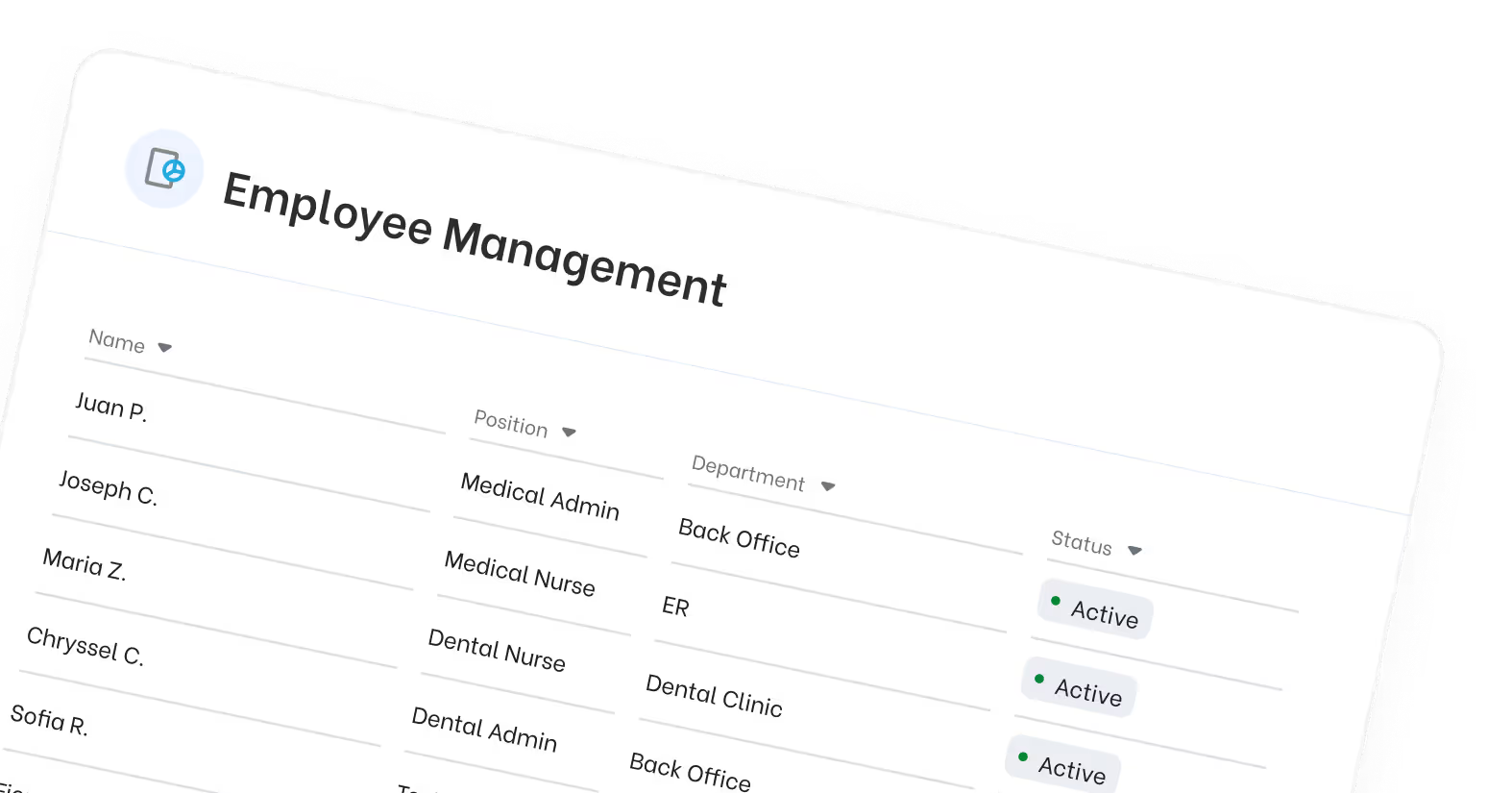How Healthcare Virtual Assistants Are Transforming Modern Medical Practices

In today’s fast-paced healthcare environment, administrative overload has become one of the biggest challenges for clinics and hospitals. Studies show that medical professionals spend nearly two hours on documentation for every hour of patient care.
Healthcare virtual assistants (HVAs) offer a solution. These trained remote professionals handle critical administrative and clinical support tasks, such as scheduling, patient communication, billing, and EHR management, so doctors can focus on patient outcomes rather than paperwork.
By combining digital tools with human expertise, HVAs bridge the gap between technology and compassionate care. They ensure that healthcare operations remain efficient, accurate, and compliant with privacy standards.
At MedVirtual, our certified healthcare virtual assistants are fully trained in HIPAA-compliant systems and healthcare workflows. This ensures that every clinic and hospital we support can deliver quality patient experiences while maintaining regulatory integrity.
What Is a Healthcare Virtual Assistant?
A healthcare virtual assistant (HVA) is a trained remote professional who supports medical practices with both administrative and patient-facing responsibilities. Unlike general virtual assistants, HVAs are specifically trained in medical processes, data confidentiality, and HIPAA compliance.
Their daily tasks may include:
- Managing appointment scheduling and patient reminders
- Handling insurance verification, billing, and EHR updates
- Responding to patient inquiries and follow-up communications
- Supporting telehealth consultations through patient onboarding and documentation
By combining healthcare knowledge with digital efficiency, HVAs help medical teams save time, reduce burnout, and maintain patient satisfaction.
At MedVirtual, every healthcare virtual assistant completes certified training in medical administration, HIPAA protocols, and U.S. healthcare communication standards. This ensures that our assistants can seamlessly integrate with clinic workflows while maintaining complete data security.
Key Benefits of Hiring a Healthcare Virtual Assistant
Healthcare virtual assistants deliver measurable value across administrative, clinical, and patient-facing areas of a medical practice. Their impact extends beyond efficiency; they directly contribute to better patient outcomes, smoother workflows, and stronger compliance.
1. Reducing Administrative Burden and Burnout
Administrative tasks account for nearly one-third of physicians’ working hours, according to a 2024 Journal of Medical Practice Management study. For many clinics, these repetitive but essential duties, appointment scheduling, billing, documentation, and insurance coordination, consume time that could be spent on direct patient care.
Healthcare virtual assistants relieve that burden by managing:
- Patient reminders and scheduling through secure systems
- Electronic health record (EHR) updates and data accuracy
- Insurance claims and billing coordination to minimize errors
By delegating these responsibilities, medical professionals can focus on diagnostics, treatment, and patient communication, significantly reducing administrative fatigue and burnout across the team.
Many healthcare organizations now integrate trained remote assistants into their daily workflow to improve operational continuity and patient satisfaction.
2. Improving Patient Engagement and Satisfaction
In healthcare, communication quality is one of the strongest predictors of patient satisfaction. When clinics respond quickly, follow up consistently, and keep patients informed, trust and loyalty grow naturally.
Healthcare virtual assistants play a vital role in maintaining that connection. They ensure that every patient interaction, whether it’s confirming an appointment, sending a reminder, or following up after treatment, is handled promptly and professionally.
Their responsibilities often include:
- Responding to patient inquiries through secure communication channels
- Coordinating follow-ups after visits or procedures to ensure continuity of care
- Collecting and managing patient feedback for service improvement
According to a 2024 Healthcare Consumer Experience Study, clinics that maintain consistent follow-ups report up to 30% higher patient retention rates. By supporting these touchpoints, virtual assistants help healthcare providers strengthen patient relationships while reducing administrative strain.
At MedVirtual, assistants are trained to balance empathy with efficiency, ensuring that patient communication feels personal, not automated.
3. Why Healthcare Virtual Assistants Are a Cost-Effective Solution
For many healthcare organizations, staffing costs remain one of the largest operational challenges. Between payroll, benefits, and infrastructure, administrative roles can account for up to 25% of total clinic expenses (Medical Group Management Association, 2024).
Hiring a healthcare virtual assistant (HVA) offers a flexible, scalable alternative. Rather than maintaining full-time, in-office administrative staff, clinics can allocate virtual support on demand, paying only for the hours or tasks completed.
Common areas of savings include:
- Reduced overhead: No need for office space, equipment, or on-site utilities
- Lower payroll costs: Virtual assistants typically cost 40–60% less than in-office equivalents
- Fewer costly errors: Professional EHR management and billing accuracy reduce claim rejections and resubmissions
Beyond savings, HVAs also help stabilize staffing gaps during peak periods, ensuring that patient care remains consistent without the added burden of overtime or temporary hires.
Healthcare organizations that adopt hybrid staffing models, combining in-house teams with remote administrative support, report significant efficiency gains and predictable cost control.
4. Enhancing Efficiency and Workflow Productivity
In modern healthcare, efficiency is not just about speed, it’s about accuracy, coordination, and reduced clinician workload. A 2024 HealthTech Insights Report found that administrative inefficiencies account for nearly 20% of wasted time in clinical operations, largely due to manual scheduling, record management, and data entry.
Healthcare virtual assistants (HVAs) improve productivity by streamlining these repetitive workflows and ensuring that no task falls through the cracks. Their structured digital support helps teams maintain accuracy and consistency even during peak hours.
Common efficiency gains include:
- Automated scheduling and confirmations, minimizing double-bookings and missed appointments
- Centralized documentation management, ensuring real-time updates to EHR systems
- Consistent communication loops between departments and patients, improving coordination
When administrative tasks are handled reliably, physicians and nurses regain valuable time for patient care. Many clinics report seeing up to a 25% improvement in appointment throughput after adopting virtual support systems.
These measurable gains highlight how virtual assistants enhance not only workflow speed but also operational accuracy, critical metrics in patient-centered healthcare.
5. Supporting Telehealth and Remote Care Systems
Telehealth adoption has surged worldwide, with nearly 70% of outpatient providers offering virtual consultations as of 2025 (American Telemedicine Association, 2025). Yet many practices still struggle with coordination, scheduling, and technology support, areas where healthcare virtual assistants (HVAs) provide essential stability.
HVAs play a behind-the-scenes role in every stage of a virtual visit:
- Scheduling and confirmation: Coordinating appointments across time zones and ensuring both patient and clinician availability
- Patient onboarding: Guiding patients through secure portals, consent forms, and pre-visit instructions
- Technical assistance: Troubleshooting video links, platform logins, or connectivity issues before sessions begin
- Documentation and follow-up: Recording visit summaries and ensuring data is updated in the EHR promptly
Because telehealth involves the transmission of sensitive medical information, certified HVAs follow strict HIPAA-compliant protocols, including encrypted communications and verified access controls. This safeguards patient data while keeping operations efficient.
Ensuring Security and Compliance with Certified Virtual Assistants
Protecting patient data is one of the most critical aspects of modern healthcare operations. In the U.S., healthcare providers must comply with HIPAA (Health Insurance Portability and Accountability Act) and, in some cases, HITECH regulations, which require strict safeguards for handling Protected Health Information (PHI).
Healthcare virtual assistants (HVAs) who work with sensitive data are trained to operate within these regulatory frameworks. Their protocols typically include:
- Encrypted communication systems for email, chat, and document exchange
- Role-based access control, ensuring assistants can only view information relevant to their assigned tasks
- Audit trails and activity logs that track every data interaction for accountability
- Ongoing compliance training, ensuring continuous awareness of updated privacy standards
Many healthcare organizations also align with broader security frameworks such as SOC 2 Type II or ISO 27001 to reinforce operational integrity. Virtual assistants trained under these guidelines add an additional layer of assurance that all patient data remains confidential and protected.
When healthcare providers choose certified HVAs trained in HIPAA and global data protection protocols, they gain not just administrative support, but a partner in maintaining patient trust and regulatory compliance.
How to Choose the Right Virtual Assistant for Your Medical Practice
Selecting the right healthcare virtual assistant begins with understanding the specific needs of your medical practice. Each clinic or hospital operates differently, some require intensive administrative support, while others need assistance managing patient communication or insurance coordination. The key is to identify which tasks consume the most time internally and find a virtual assistant service equipped to handle them with precision and confidentiality.
Experience within the healthcare sector is essential. Assistants should be familiar with medical terminology, electronic health record systems, and HIPAA-compliant workflows. Practices benefit most from professionals who can integrate seamlessly into existing systems rather than requiring extensive retraining or supervision.
Beyond technical competence, communication style and reliability matter. A healthcare virtual assistant must maintain professionalism in patient interactions, demonstrate responsiveness under pressure, and uphold data accuracy at all times. Transparent onboarding and continuous feedback also help ensure a smooth partnership, allowing the assistant to align with your clinic’s values and pace.
Finally, true compatibility goes beyond skills, it includes trust. Choosing a virtual assistant or service provider that values long-term collaboration and demonstrates accountability builds confidence on both sides. When trust and efficiency are established early, healthcare teams can delegate freely and focus their attention where it matters most: improving patient outcomes.

Why Healthcare Virtual Assistants Are the Future of Modern Medical Practices
Healthcare virtual assistants are redefining efficiency and care quality in the medical field. By managing administrative tasks, supporting telehealth, and ensuring compliance, they enable healthcare professionals to focus on what matters most, patient care.
Their adaptability, cost-effectiveness, and digital expertise make them essential partners in modern healthcare operations. As the industry continues to evolve, integrating virtual assistants will remain key to improving outcomes, streamlining workflows, and maintaining patient trust.
With MedVirtual’s expert healthcare virtual assistant services, clinics and hospitals can confidently transition to a smarter, more efficient model of care, one that prioritizes both compliance and compassion.
Frequently Asked Questions
- Are healthcare virtual assistants compliant with the Health Insurance Portability and Accountability Act?
Yes. Compliance is the foundation of our service. Our remote professionals are fully trained and certified in all Health Insurance Portability and Accountability Act protocols. We operate under a mandatory Business Associate Agreement with your medical practice or hospital, which legally guarantees the protection of your patient health information.
- What is a Business Associate Agreement, and why is it important?
A Business Associate Agreement is a legally required contract between your medical practice (the Covered Entity) and MedVirtual (the Business Associate). This agreement stipulates precisely how your remote assistants are permitted to use and disclose patient health information, binding us to the same strict security and confidentiality standards as your in-office staff.
- How do you ensure data security when the assistant is working remotely?
Security protocols include:
- Encrypted Systems: Assistants use secure, encrypted communication tools for all emails, charts, and document exchanges.
- Role-Based Access: Access to the Electronic Health Record system is limited only to the functions necessary for their assigned tasks (like scheduling or billing).
- Activity Logs: All interactions with patient data are recorded via audit trails for complete transparency and accountability.
- Can a healthcare virtual assistant manage our Electronic Health Record system?
Absolutely. Our healthcare virtual assistants are trained to be proficient in leading Electronic Health Record platforms. They can accurately perform tasks like data entry, updating patient charts, documentation, and processing information in real time, ensuring that the system is utilized efficiently and accurately.
- What is the typical process for integrating a virtual assistant into our current workflow?
Integration is fast and structured. We begin by assessing your practice's specific pain points (scheduling backlogs, billing errors). We then match you with an assistant who has relevant clinical experience and expertise in your software. The assistant integrates by shadowing and aligning their schedule with your United States operating hours to ensure a seamless fit with your existing team.
- Can a virtual assistant assist with our telehealth services?
Yes, they are essential for remote care. They handle all the non-clinical coordination, including:
- Scheduling virtual appointments across time zones.
- Onboarding patients to secure video platforms.
- Managing consent forms and pre-visit documentation.
- Ensuring the visit summary is promptly documented in the Electronic Health Record.
9. How do healthcare virtual assistants provide a cost-effective solution?
Remote assistants provide significant cost savings by eliminating major overhead expenses associated with in-office staff, such as:
- Employee benefits, health insurance, and payroll taxes.
- Recruitment, training, and equipment costs.
- The expense of dedicated office space and utilities. This allows your practice to pay only for the productive support hours it actually needs.
10. What kind of return on investment (ROI) can we expect from using a virtual assistant?
The return on investment is measured both financially and operationally. Practices typically see:
- Cost Savings: Lower annual operational expenses (often 40–60% less than a full-time hire).
- Revenue Gains: Faster claims processing and reduced billing errors lead to improved cash flow and fewer administrative write-offs.
- Efficiency: Improved appointment throughput and reduced physician burnout, allowing clinical staff to spend more time on direct patient care.






